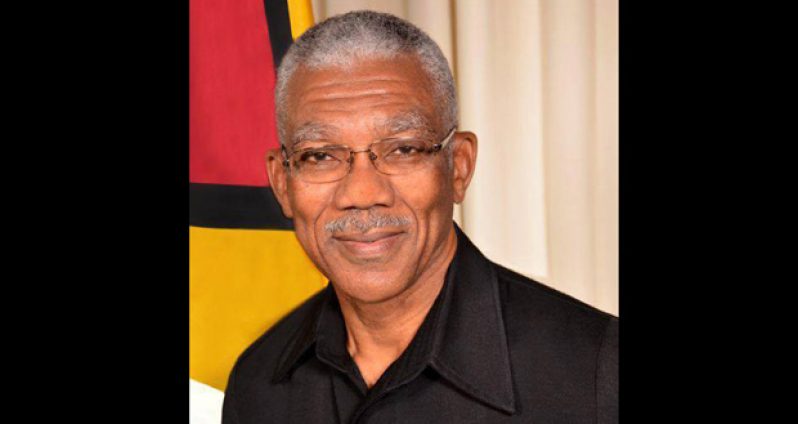CITIZENS would have no one to blame but themselves if they fail to vote at this week’s Local Government Elections (LGE), said President David Granger as he responded to questions posed by reporters on his weekly programme, ‘The Public Interest’, which dealt with the issue in its Friday broadcast.

President Granger explained that while, traditionally, LGE has seen a lower turnout of the electorate, not only in Guyana but globally, he believes that citizens need to understand the importance of the elections.
“It is natural; there is nothing I can do about that,” he said as he noted that general and national elections command the attention of citizens more than LGE. “All politics is local,” the President added, while noting: “As soon as you step out of your door, whether it is flooding, drought, potholed roads, safety, solid waste management, Zika, Ebola…wherever you live in the country, you are into the realm of local governance.”
He said it is important that citizens understand what local governance brings to the table.

“If they don’t take control of their communities and villages, then they will suffer the consequences of poor management; and this is what happened to us for a very long time: Many NDCs were removed and IMCs were imposed.”
President Granger added: “In a way, you have yourself to blame if you don’t go out there and vote and elect representatives who can administer your communities, municipalities the way you want it to administered.”
The President said he would fulfill his promise of ensuring that LGE are held promptly every three years, in accordance with the Constitution.
“It would be worse than sitting on your hands not to vote,” he said.
He noted that his message is late for members of the Disciplined Forces, who voted on Tuesday. “But I urge all Guyanese to go forth on March 18; at least Guyanese within the municipalities, because many indigenous communities do not fall under the Local Government system, and (they did not get opportunity) to choose persons whom they trust to run these communities.”
The March 18 elections, he said, are perhaps more important than General Elections, because they affect the communities in which citizens live and work.
On March 4, members of the diplomatic community and the Private Sector Commission (PSC) called on citizens to vote in these elections, which were last held in 1994. They also called for the “beefing up” of campaigns to educate the masses.
PSC member Gerry Gouveia believes that while LGE the world over does not attract massive crowds, as is the case of General and National Elections, the fact that the elections are being held after a hiatus of two decades is very important.
“These elections are (so) very important for Guyana that we can’t overemphasise the fact that people need to be encouraged to vote, and then to insist that the candidates and political parties join GECOM in that whole effort in sensitizing and getting people out there, and educating the voters and so on,” he posited.
Deputy Chief of Mission at the U.S. Embassy here, Brian Hunte, said there needs to be a collective approach to educating the nation about the elections and encouraging persons to vote.
“GECOM does not bear the sole responsibility for educating voters; that is a shared responsibility between GECOM, local authorities, political parties; between candidates that are running, civil society and organisations and the media,” he said.
GECOM has been the subject of criticisms for what has been perceived to be the lack of interest of the populace in the elections, but Hunte said fingers should not be pointed at GECOM.
“All of us have a responsibility to make sure voters are educated and know where they need to go to vote,” he declared.
COMMUNITY ECONOMIC DEVELOPMENT
The President noted that strong communities and neighbourhoods are the pillars for the successful implantation of his Five ‘E’ economic plan, which speaks to promoting economic development through Education, Employment, Empowerment, Enterprise and Equity in local communities. He believes that through good local governance, economic development will prosper.
President Granger noted that through strong community leadership and economic development, there can be opportunities for massive investments. He believes that there is too much reliance on central government; to wit, communities depending on subject ministers to carry out certain functions.
Central Government nevertheless has a role to play in developing investment and community enterprises, he said. Government, he said, would not be involved in the management of communities and their economic affairs, but would create a safe and enabling environment for investors.
Similar sentiments have been expressed by British High Commissioner Greg Quinn and Charge D’Affaires of the Canadian High Commission, Mr Daniel Joly.





.jpg)








